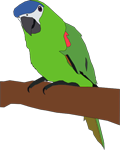Eastern Whipbird
Psophodes olivaceus
Other Names: Whip Bird, (Coach-whip Bird, Psophodes crepitans, 19th Century)
Family: Cinclosomatidae (Quail-thrushes and allies, 8 species in Australia)
Size: 25-30 cm
Distribution: Within about 200 km of the coast of NSW, Eastern VIC and Most of QLD except the north
Status: Common to mderately common
Habitat: Dense understories of rainforests, coastal scrubs, wet sclerophyll forests, riparian (near a stream) forest
References: Simpson and Day, Reader's Digest
The Eastern Whipbird is famous for its call which sounds like the crack of a whip. The call is actually made by two birds, the male makes the whipcrack, and if the female replies it is a sort of "choo choo choo" sound. It sounds truly amazing if you happen to be between the pair when they call. The whip sound is heard at the beginning of the theme song to "Skippy the Bush Kangaroo".
Eastern Whipbirds are heard much more than they are seen as they like to hide in dense scrub, from which they rarely emerge. They are also a drab colour which blends in very will with the background. The crest on their head is a distinguishing feature. The tail is fairly long and there is a light coloured patch on the lower side of the head. In the photo below this looks like a slightly lighter grey than the rest of the bird, sometimes it is lighter than this and the rest of the head is darker.

Photo: Blaxland, Blue Mountains NSW

Artwork: John Gould, 'The Birds of Australia', 1848. Original Scanned Image.
Some Birdwatching Resources
|
 NEW: The Complete Guide to Australian Birds, by George Adams.
NEW: The Complete Guide to Australian Birds, by George Adams. This is another of the newer ones (published in November 2018) that I bought recently (June 2020). It's got photographs rather than drawn pictures of the birds. They're really good quality photos. 10 or more years ago, the Australian bird field guides with photographs definitely weren't in the same class as the ones with hand-drawn pictures, but that seems to have changed. Now I think it's more a matter of personal preference. I imagine that the massive increases in availability of long-zoom-distance digital photographic equipment has made it much easier for there to be better quality photos of birds.
This book has colured strips down the outside of each page so you can find the different types of birds easily, which I really like.
Purchase from Australia (The Nile)
Purchase from Australia (Fishpond)
Purchase from Amazon.com (USA Site)
Purchase from Amazon.com.au (Australian Site)
| See AlsoAustralian Bird Field Guides
Return to Australian Birds
Return to Site Map
Share This Page
birds
Content is copyright © Survival.ark.au 2005-2025 All Rights Reserved. Terms of Use. Definitely read the disclaimer before trying anything from this website, especially including the practices and skills. This website uses affiliate links – this doesn't cost you any more, but I get a commission on purchases made through the website. As an Amazon Associate I earn similarly from qualifying purchases.
|




